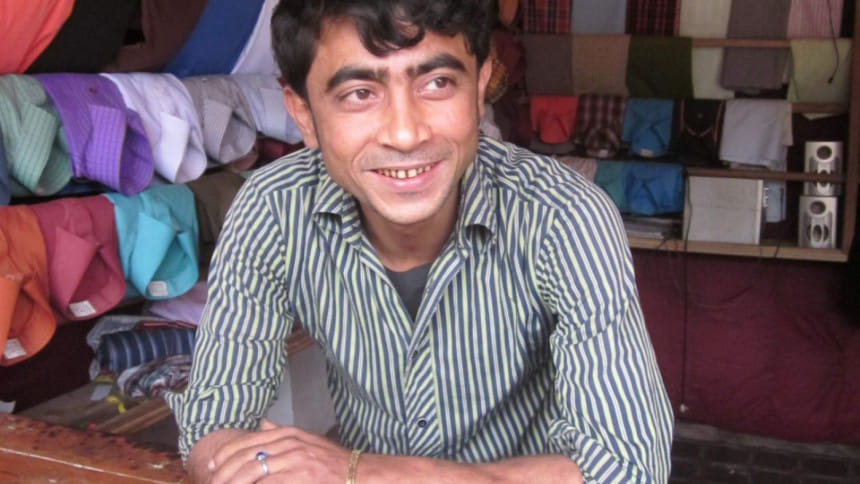Once was a bird hunter

Nowadays, 33-year-old Muslim Miah of Cox's Bazar's Moheshkhali earns his living as proprietor of a tailor shop in Ghotibanga Bazar of Kutubjom Union. When business is good the retired fisherman's son earns 5,000z – 10,000 taka per month from his shop – a modest income but enough to keep the bachelor on his feet financially.
For Miah it's a career change. He used to be a bird hunter.
The shoals of southern Moheshkhali and Sonadia are rich habitat for shorebirds. The area attracts numerous species including the nordmann's greenshank and spoonbill sandpiper, endangered migrant species from the Siberian Arctic that arrive each winter after a long journey south. Worldwide there remain as few as 1,000 mature individuals of the former species and 200 of the latter.
Prior to October 2011, Miah, together with more than 20 other hunters, would head for the shoals at low tide and set up expansive nets along the shoreline. The only other income generating activity they had was collecting wood from the forest.
"It was dirty, difficult work," says Miah, who had the opportunity to study to Class V.
The hunters would wait for shorebirds to entangle themselves as they landed, knowing the wild flapping of any caught bird would attract yet more.
Eurasian curlew, black-tailed godwit, common kingfisher, Indian pond heron and black-headed ibis: these species were common fare at Ghotibanga dining tables. "Shorebirds were a usual food item in the market," says school teacher Morshedul Hoque, "We never thought about it."
The northern shoveller, a common duck species, was particularly sought after for being tasty.
As a bird hunter Miah's income was significantly higher than today. A single Eurasian curlew, locally known as 'totlarku' and considered to be "better than chicken" would fetch 150 taka in the market. By selling 7 – 10 birds per day Miah could make up to 1500 taka.
But in 2011 the Bangladesh Spoonbill Sandpiper Conservation Project (BSCP) which was founded two years earlier with the goal of protecting the local habitat for spoonbill sandpipers, signed conservation agreements with 25 identified active hunters including Miah.
Resources were provided for alternative livelihoods, with Miah receiving 12,000 taka to buy a sewing machine and cloth stock. Through loans he was able to reach the 70,000 taka needed to establish his shop.
"Some of the hunters are now fishermen," he says. Yet others took to watermelon cultivation, livestock rearing or grocery stores.
As important as providing alternate livelihoods, was to change the mentality of both hunters and the local community towards eating wild birds. This was attempted through ongoing awareness raising activities including lectures, film screenings, photographic displays, folk songs and staged drama events.
According to conservationist Mohammed Foysal, 29, of South Keraniganj, involved with the BSCP project since 2010, villagers were presented with two main conservation arguments. "One is the scientific argument," he says, "about the value of healthy ecosystems while the other is philosophical, that all creatures have a right to exist."
He believes the latter approach proved the more persuasive, as it was explained that if they continued to hunt there would come a day when there simply weren't any spoonbill sandpipers left in the world.
To date, awareness-raising efforts have met with some success. Miah is apologetic for his past profession. "We did it out of need," he says.
Ironically, Miah believes he has never seen a spoonbill sandpiper, the signature species of local conservation efforts, since hunters focused on the more lucrative larger species and paid little attention to a by-catch bird barely 16 centimetres in length.
The tailoring business has not proved easy for Miah. In a small market like Ghotibanga, cloth is often acquired after an order is placed and this year with the dual challenges of political shutdown and a low fish catch, which means for many customers a shortage of taka to spend on clothes, business has been particularly tough. Weeks have passed without Miah receiving a single order.
Nonetheless he attends his shop daily and believes in the future of his newfound, more eco-friendly profession. "Business will be good when the fish bite," he says.

 For all latest news, follow The Daily Star's Google News channel.
For all latest news, follow The Daily Star's Google News channel. 



Comments